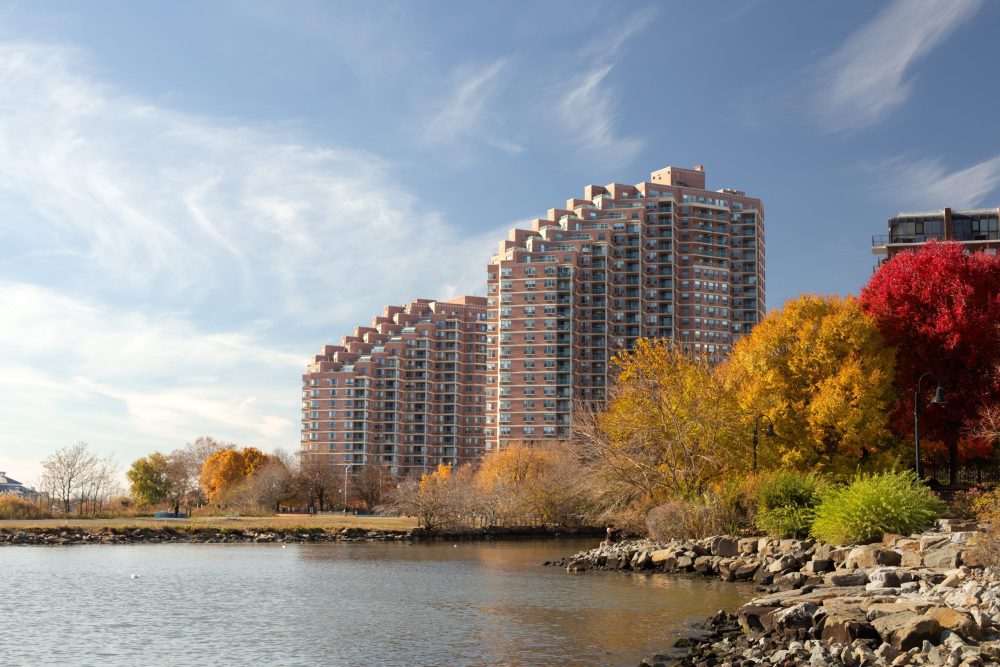Rita and Odette Botelho were moving the last of their items out of an apartment they’d lived in for 18 years when the building’s doorman suggested they speak with a tenant named Kevin Weller.
It was the summer of 2022, and tenants at the Portside East and Portside West apartment towers in Jersey City, New Jersey, had been hit with rent increases that ranged from 25 to 50 percent, hikes that many residents—like the Botelho sisters—couldn’t afford.
They went upstairs and met Weller, Michele Hirsch, and other tower residents who were gathering signatures to create a tenant association at each of the buildings. They intended to organize to fight the rent increases, as well as other building issues, including new amenity charges and maintenance concerns.
“We signed the petition, right then and there,” Odette says.
Not long after, the tenant associations took form, and the tenants began submitting petitions to the city for what they suspected were illegal rent increases. Jersey City is one of dozens of municipalities in New Jersey that have rent control or rent stabilization policies on the books, with some exceptions, and the tenants believed their building should have been subject to rent control.
This whole system, in our view, has been set up in such a way that rent control is certainly not enforced when it matters.”
Kevin Weller
They dug through newspaper archives to learn more about the buildings’ history; they filed records requests with the city for more information on the properties; and the roughly 300 tenant association members—the Botelho sisters included—took turns showing up to every single council meeting in a year’s time to hold the city’s feet to the fire.
“I’m pretty sure there’s a target in the back room of the clerk’s office with my name on it that they throw darts at this point because I don’t know how many [public records requests] I’ve submitted,” Hirsch quips. “But that’s how we were able to learn a lot about the status of each building.”
Countless hours of research later, tenants believed they had found evidence that the buildings’ 527 units—owned by Equity Residential—were indeed subject to rent control, and the exorbitant rent increases, they argued, amounted to an illegal overcharge.
After more than a year of sounding the alarm, the tenants’ findings were confirmed in October when the Jersey City Rent Leveling Board ruled that the towers were indeed subject to rent control because the building’s owners hadn’t filed for an exemption. The board also indicated that rents should be rolled back to 2016 levels, a decision that could result in millions in rent overpayments being paid back to tenants.
Weller and the tenant associations say owners of many other buildings in the city, and even the state, are “acting as if they’re exempt from rent control but are not.” Neil Marotta, an attorney for the tenant group, agrees. “That is possibly the case in other properties in Jersey City in which the tenants should be protected by the rent control ordinance but have not been.”
“This whole system, in our view, has been set up in such a way that rent control is certainly not enforced when it matters,” Weller says. “Our experience, after a year of fighting, is that it just doesn’t get enforced.”
In response, Equity Residential filed a federal suit against Jersey City and its rent leveling board on Nov. 10 challenging the decision and the city’s rent control ordinance. It claims that the building’s previous owner sent notice to Jersey City officials to be exempt from the policy decades ago, and even more, that buildings like the Portside Towers shouldn’t be subject to rent control in the first place.
Tenants say the city has not produced any documents proving the buildings were exempt.
While the rent leveling board’s decision was celebrated by tenants at the two properties, it remains bittersweet for Rita and Odette. The sisters had moved out of their apartment well before the decision was made.
Rita now lives in another New Jersey town, and Odette, a public school teacher working in nearby Tribeca, has been couch-surfing and using Airbnb to stay in the area.
“Our whole lives were there,” Rita says. “We had to uproot everything.”
“We were celebrating, but in the same way feeling a sense of sadness,” Odette says. “We’ve been helping the cause . . . but it’s not like I have an apartment, or my sister has an apartment.”
No exemption on record
When they first told their neighbors they were moving from Brooklyn to Jersey City in 2001, Rita and Odette’s friends thought they were crazy. It was before the city’s waterfront was transformed, bringing with it luxury apartment complexes and expensive restaurants, and neighborhoods in the area were seen as a place to avoid.
Now, the area has rental and home prices matching that of neighboring Manhattan. Since 2013, the average rent for an apartment in Jersey City has increased by more than 20 percent, according to data from CoStar Group Inc., a real-estate data and analytics company. And since the start of 2020, Jersey City rental prices have climbed more than twice as fast as Manhattan, according to a report in the Wall Street Journal.
Equity Residential has a large portfolio of housing units in major cities across the country. The company’s Portside East and Portside West apartment towers line Jersey City’s coastline and are offered as rental apartments that bring “Manhattan elegance to the heart of a historic, vibrant Jersey City neighborhood,” according to Equity Residential’s website.
[RELATED ARTICLE: What Do All These Rent Regulation Terms Mean?]
Tenants started getting exorbitant rent increases in 2021 and 2022, following the end of a city-sanctioned moratorium on rent increases during the pandemic. They say they pleaded with building managers, but there was nothing tenants could do to get those rent increases lowered.
Rita and Odette’s 25 percent increase proved too much to afford on their own. They frantically looked for roommates, but no one could afford the rent.
“My sister and I really started to panic. And as it got closer and closer, we started getting rid of all our furniture,” Odette says. “There were two weeks left, and we had no place to go, so we just started putting our furniture up on Craigslist.”
Under New Jersey state law, municipalities that adopt rent control can allow for exemptions for developers of new construction. Jersey City’s rent control ordinance, which has been in effect since 1986, states that a building can be exempt from the policy if it’s less than 30 years old. However, the property owner must file for an exemption; it’s not automatically granted.
Equity Residential isn’t the original owner of the towers, which were built in 1992 and 1997. For decades, the buildings operated under the premise of exemption from rent control. But the city has never been able to produce any documentation showing that the building’s original owners filed for an exemption, tenants successfully argued.
“Equity [Residential], the current landlord, they didn’t own the building at the time it was constructed, so they couldn’t do anything—they bought whatever they bought,” Weller says. “But the original owners, the ones who owned it when they built them, they didn’t file anything.”
“We OPRA’d the city to get every exemption that they have for every building ever,” he says, “and our buildings were not included in that list.”
At the October rent leveling board meeting, board commissioner Dannon Hill said tenants are not being treated fairly. “This is happening all over the country . . . it’s happening too much in Jersey City. . . Owners are not doing what they’re supposed to do to allow the tenant to get their due. I understand the owner’s position,” Hill said, “but I also feel that as an owner there’s an opportunity you must take to do your due diligence to make sure the tenant is protected.”
Equity Residential disputes this and says in its lawsuit that the Portside towers qualified for the exemption “from the beginning, including because Portside’s predecessor provided notice to the city construction official in 1994, which, along with other attendant circumstances, was all that was required to establish substantial compliance.”
The rent leveling board’s enforcement of rent control, the lawsuit reads, violates several constitutional protections in the United States and New Jersey constitutions, including an unlawful taking of property, among other claims.
“The board’s decision, if allowed to stand, would potentially transfer millions of dollars of value from the property to the tenants,” Equity Residential said in its suit. “Application of the decision may also diminish the market value of the property beyond the value of the lost rent.”
Jersey City spokesperson Kimberly Wallace-Scalcione says the city supports the use of the appeals system and added that “we are hopeful this will set a precedent that the city already has a fair and just system in place.”
ripple effects
Weller hopes to use the tenant associations’ work as a template for others in the state who suspect their building may be subject to rent control.
“Most tenants maybe wouldn’t want to put the time and effort or the money forward to develop the legal briefs that really make it clear what the statute is,” he says. “But we think that if we make it available to people . . . we can leverage this huge amount of work, and just let other people basically benefit from it.”
In neighboring Hoboken, for example, the city’s rent leveling board was hearing a landlord’s appeal to eliminate rent control in two apartment complexes, the Jordan and Avalon Hoboken. Weller made a presentation to the board using the same argument presented in Jersey City. Commissioners rejected the landlord’s appeal.
It’s so much more difficult for tenants to know whether or not they’re covered and how they’re protected … “
And in Montclair last month, tenants cited the same legal argument—no exemption without the required paperwork—to successfully argue that the apartment building they lived in was subject to rent control after they received a 40 percent rent increase.
Marotta, who serves as Union City’s rent control lawyer, oversaw a similar case in Union City, where a court ruled that an owner’s failure to comply with requirements set forth in New Jersey statute—and to maintain records of such compliance when claiming a permitted exemption from local rent control or rent leveling laws—could result in the loss of any such exemption.
“Rent leveling has to provide the property owner the opportunity to make a reasonable return on their investment, so there is a mechanism in the ordinance that says OK, if you’re not making a reasonable return on your investment, then you can make an application for a hardship increase,” Marotta says. “But it doesn’t mean they make an extreme return on their investment.”
Jersey City in January 2020 established a new office of landlord/tenant relations to “administer and enforce” the city’s rent control ordinance. But why the office never questioned the lack of exemption on file for Equity Residential is unclear. A spokesperson for the city did not address questions as to whether there was a procedure in place to enforce rent control when there are no exemption filings on hand.
fighting for enforcement
The Portside Towers tenants’ activism stands as an example of how enforcement of rent control and tenant protection policies is often as much work as passing the policies in the first place.
“You think it’s an uphill battle just to win rent stabilization,” says Tram Hoang, a senior associate with PolicyLink, a research and advocacy group that works to advance racial and economic equity. “And then you face the challenge . . . to ensure that the jurisdiction, whether that’s a state or a city or a county, actually creates the infrastructure to enforce it.”
Hoang oversaw a campaign in St. Paul, Minnesota, to put rent stabilization on the ballot in 2021. That initiative won, but the policy has since been amended to include various exemptions, including one for new construction. The various changes resulted in about one-third of St. Paul’s rentals being exempt from the rent stabilization policy. Enforcement is also a problem.
“It was incredibly challenging for tenants who are suddenly celebrating this huge win, celebrating the idea of housing stability and predictable housing costs, and then seeing their city council pivot to ‘OK, how are we going to weaken this policy?'” she says.
“It’s so much more difficult for tenants to know whether or not they’re covered and how they’re protected because it’s almost like this flowchart that you have to go through to figure out if you’re covered.”
Municipalities are naturally deferential to development, Hoang says. “We’ve had decades of city governments where there are entire departments dedicated to permitting, building, inspections, which are all production-related, and so few resources and offices for tenants,” she says. “I can’t think of many cities that have any kind of . . . tenant protections office.”
Eddie Robinson, a member of the Los Angeles Tenants Union, says that reforms and tenant protections that are codified into law often force landlords “to be more creative and more sophisticated.”
“The landlords that we’re fighting on these issues—they’re able to do these things with plausible deniability that kind of fall within gray areas of the law that don’t get enforced, and it seems like that’s something that is always going to happen when there’s no moral or investigative component to the law,” he says.
This conflict, Robinson says, “bumps up into an issue of private property, where regulatory agencies are terrified to be seen as infringing on owners’ rights to private property through the enforcement of these laws.”
“We’ve had housing department people here in Los Angeles say, off the record, that they don’t enforce some of these laws because they’re scared of being sued by landlords,” he says. “That’s the central contradiction that if you don’t overcome it’s just going to continue to be this stalemate.”
What’s next for tenants?
In the wake of the rent leveling board’s decision, rent increases at Portside East and Portside West are supposed to be limited to 4 percent, or the percentage difference between the consumer price index year over year, whichever is lower. But much remains uncertain in the wake of Equity Residential’s suit.
For instance, will Equity Residential be on the hook for overcharged rent if the courts side with Jersey City? Tenants speaking with Shelterforce say they estimate they’ve each paid more than $20,000 in additional rent in the past two years, and Weller says tenants have collectively been overcharged by more than $135 million.
Rita and Odette Botelho are among those who could get rebates based on overcharges since 2016, Weller says.
For now, Odette says she’s waiting until the full details and ramifications of the case are clear.
“(Other tenants) keep telling me ‘Come back home, your home is waiting for you,'” she says. “Until I know what that really means, I’m not doing anything about that. What is the rent really going to be: Is it rent control for the rich? Or is it rent control for the middle class?”
“But, yes, if I could move back into my home, I would,” she says. “It’s my neighborhood . . . I have friends there. That’s where I lived my life.”
Editor’s Note: This article was updated to correct how much Jersey City’s Rent Leveling Board limited rent increases at the Portside East and Portside West towers.





Thanks so much for this article. Making tenants aware of their rights in challenging rent increases is vital as most rent levelling schemes do require the tenant to raise the issue with the state entity that is enforcing the law. Perhaps most interesting here is Attorney Moratta’s observation is that rent control or the more model forms of rent levelling is not an expropriation of landlord property. All such schemes, to be immune from landlord challenge, must insure that the building owner receives a reasonable return on investment. This return is usually between 4 – 8% return on investment. If a landlord is not getting that they may apply for a hardship increases. It is only when landlords want to exploit a rapidly rising market that the worst abuses occur.
Thank you. I am holding on to this article. I live in a rent control building in JC. I am keeping my eye out for anything funny. I am not a fan of the management office, but they try to go by the books. JC is too expensive. I live in fear as well. These new cats that are moving in, act like it’s their city bc they pay the high rent. But it was jc residents like myself who fought to drug dealers to keep out my building or gang members who tried to hurt my neighbor. I have endless stories. I love my apartment and where I live. I hope I never experience that nightmare. I felt the two sister’s pain. I hope they can get their home back” together” wherever they end up!